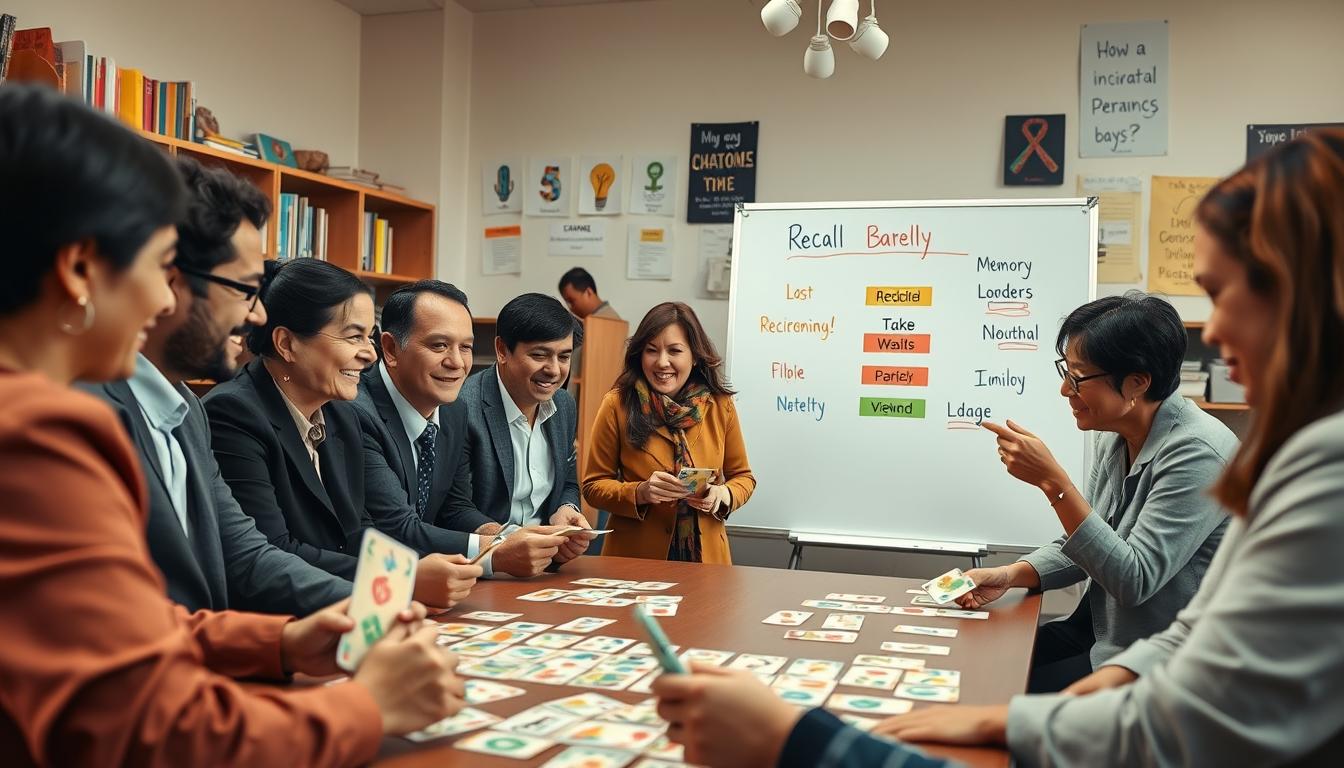Mental games that teach emotional and financial decision-making
Ever thought playing a game could improve your money management? Traditional education often misses the mark on teaching financial skills. But brain games offer a new way to boost emotional intelligence and make better financial choices.
These games are fun and interactive, reaching people in ways textbooks can’t. They use simulations to teach financial planning in a hands-on way. Let’s explore how these games can change the way we learn about money, making it fun and effective.
Introduction to Decision-Making Skills
Decision-making skills are key in our daily lives and when facing big financial challenges. They help us look at different options, think about what might happen, and make smart choices. For young people, learning these skills early is vital for understanding money.
Studies show that many young people don’t know much about money. The National Financial Educators Council found that teens know about 64.9% of financial management. This shows how important it is to teach decision-making skills. They help build emotional intelligence and a deeper understanding of money.
Teaching decision-making skills helps young people manage money and prepares them for the future. It’s about making them ready for the world of finance. By focusing on decision-making, we can raise a generation that can handle today’s financial challenges.

The Importance of Emotional Intelligence in Finance
Emotional intelligence is key in making smart financial choices. It helps people deal with tough financial situations. Those who are emotionally smart can weigh risks and benefits better, making informed decisions.
They can handle stress better, which is important for their financial health. This skill stops them from making quick, emotional purchases. It helps them stay focused and make wise investments and spending choices.
Many students, about 72%, face stress over money matters. This shows why teaching emotional intelligence in finance is vital. With this skill, students can tackle real financial challenges. This improves their financial health in the long run.

Understanding Game-Based Learning
Game-based learning is a strong tool for improving education, especially in tough subjects like finance. It makes learning fun and boosts how well students remember what they learn. Games help students get involved and understand important financial ideas better.
Engagement and Retention in Learning
Getting students to care about learning is key. Games make learning fun and less scary. This makes students remember what they learn better.
Studies show that games help students remember key concepts and strategies. This is because they actively take part in their learning.
Why Games are Effective for Finance Education
Games are great for teaching finance because they mimic real-life money situations. They let students try things out without real risks. This is perfect for learning about big financial choices.
By using games, students can practice things like budgeting and investing. They get feedback right away. This helps them understand and use what they learn in real life.
Overview of Key Financial Concepts
Knowing key financial concepts is key to financial stability. Savings, budgeting, investing, and debt management are crucial. Each one plays a part in your financial health.
Savings, Budgeting, and Investing
Savings act as a safety net for emergencies or future plans. Setting aside money regularly is important. Budgeting helps track money coming in and going out. It shows where you can cut back on spending.
Investing opens doors to growing your wealth. It’s about making smart choices about where to put your money. This includes managing risks and choosing the right investments.
The Role of Debt Management
Debt management is vital in today’s world. It’s about understanding loans and their impact. This means looking at interest rates and the long-term effects of debt.
Learning to manage debt well is essential. It helps keep your finances healthy and supports your goals.
Brain Games with Financial Planning Simulations
Adding financial planning simulations to brain games makes learning fun and interactive. These simulations let users try out different financial choices. This way, they learn to think critically about their decisions.
As players go through these simulations, they pick up important skills. These skills help shape their financial futures.
Interactive Learning through Play
Brain games that focus on interactive learning are super engaging. Games like “Payback” mimic real-life financial challenges. They help players see how their choices affect their money.
This method of learning makes the material more relatable. Players get to practice making decisions in scenarios that mirror real life. This sharpens their decision-making skills.
Benefits of Using Simulations in Financial Education
Simulations in financial education offer many advantages. They provide real-life scenarios for practicing financial skills like budgeting and investing. Players get to try things out without risking real money.
Games like “The Stock Market Game” and “Get a Life” teach players about the effects of their actions. This way, learners become better at making informed financial decisions. It boosts their financial literacy.
Popular Mental Games for Teens and Young Adults
Teaching teens and young adults about money can be fun with the right games. These games are not just entertaining. They also teach valuable lessons about money management and making smart choices.
Introducing Financial Football
Financial Football mixes sports excitement with finance lessons. Players move forward by answering finance questions, like budgeting and saving. It’s a fun way to learn about money, making it easier to understand real-life financial decisions.
The Experience with Money Magic and Financial Decision Games
Money Magic tests players’ budgeting skills against instant gratification. It teaches the value of planning and thinking about spending. Financial decision games also help players learn to weigh choices, making them more money-savvy.
Lessons from Spent: Making Hard Choices
Spent puts players in a tight budget scenario. It forces them to choose between needs and wants. This game teaches the importance of prioritizing and being resourceful, showing the real impact of financial decisions.
Games for Younger Audiences: Grades K-5
Teaching kids about money in grades K-5 is key for their future. Games like Learning Coins and Money Bingo make learning fun. They help kids understand coins and their values.
Learning Coins and Money Bingo
Learning Coins helps kids know different coins and their values. It’s a fun way to learn about money. Money Bingo adds to this by making it a game. Kids match coins to spaces on their bingo cards, making learning fun.
Dolphin Feed and Dollar Dive
Dolphin Feed and Dollar Dive take learning to the next level. Dolphin Feed has kids give the right coins to a dolphin. Dollar Dive is about finding coins under time pressure. Both games teach important money skills like quick thinking and counting.
| Game | Core Concept | Target Skills |
|---|---|---|
| Learning Coins | Coin identification and values | Recognition, counting |
| Money Bingo | Matching coin values | Recognition, tactical thinking |
| Dolphin Feed | Feeding coins of specific values | Quick thinking, counting |
| Dollar Dive | Diving for matching coins | Time management, problem-solving |
These games make learning about money fun for kids. They help young people develop skills for managing money later on.
Games for Middle School Students: Grades 5-8
Middle school is a key time for learning about money. Games make learning fun and teach important skills. Hot Shot Business and Lights, Camera, Budget are great examples, making finance fun and easy to understand.
Hot Shot Business and Lights, Camera, Budget
Hot Shot Business lets players run their own business. They face real challenges like marketing and managing staff. It’s a great way to learn about business and money.
Lights, Camera, Budget is all about making movies. Players have to manage budgets and deal with costs. It’s a fun way to learn about making smart financial choices.
Taking a Hit with Hit the Road
Hit the Road: A Financial Adventure is another exciting game. It’s about a road trip where players learn about budgeting and saving. It makes learning about money fun and relatable.
High School and Beyond: Advanced Learning Games
High school students are looking into their future careers and financial duties. Games like Get a Life and the Stock Market Game help them learn. These games make learning fun and teach important money lessons.
Get a Life and The Stock Market Game
Get a Life lets players make career choices and handle money. It teaches budgeting, saving, and planning for the future. The Stock Market Game shows how to invest and understand market risks. It helps students grasp the ups and downs of the stock market.
Understanding the Gig Economy through The Uber Game
The Uber Game shows what it’s like to work in the gig economy. Players learn to manage money, time, and the uncertainty of gig work. It prepares students for the challenges of today’s job market.
The Role of Play in Developing Financial Literacy
Play is a fun and effective way to learn about money. It helps people understand money matters while feeling less stressed. Games make learning about money interactive and easy to grasp.
Stress Reduction and Understanding Financial Pressure
Playing financial games helps people get used to the stress of money decisions. It’s a safe space to practice dealing with real-life money problems. Players learn to handle financial stress better as they go through different scenarios.
Building Critical Thinking and Strategy Skills
Playing games about money boosts critical thinking and planning skills. Players have to think deeply, predict outcomes, and plan their moves. This not only sharpens their money smarts but also prepares them for real money challenges.
Challenges in Financial Decision-Making
Teenagers face big challenges when making financial decisions. These choices can affect their future a lot. It’s important to understand and deal with these issues to help them manage money well.
They often make mistakes like spending too quickly and not thinking about the future. This can make them doubt their financial choices. So, teaching them how to make smart money decisions is key.
Common Pitfalls for Teenagers in Financial Choices
Teenagers often make quick choices without thinking about the future. They might buy trendy items with their money, ignoring the need to save. This is because they value now over later.
They also might not know about things like interest rates and credit card debt. This lack of knowledge can lead to bad money choices. It’s important to help them see these mistakes so they can make better decisions.
Addressing Emotional Barriers to Financial Success
Emotions can stop teenagers from being financially successful. Feeling scared or worried about money can make them unsure or avoid making choices. This makes their financial challenges even harder.
Using games and simulations in class can help. It gives them a safe way to deal with their feelings about money. This helps them build a better relationship with money and overcome their emotional barriers.
The Future of Financial Gaming: Trends and Innovations
The world of financial gaming is changing fast. New technologies are key in making learning fun and effective. Teachers and creators are working hard to use these tools to teach finance in new ways.
This change brings many chances to practice real-life money skills. It helps both students and teachers learn more.
Emerging Technologies in Game-Based Learning
New trends include using augmented reality (AR) and virtual reality (VR) in finance games. These tools make learning more real and exciting. They help students understand finance in a hands-on way.
The future of financial gaming will depend on these new methods. They promise to create educational games that are both fun and educational.
- Expanding accessibility through mobile platforms
- Utilizing AI for personalized learning pathways
- Gamifying financial literacy tests and assessments
- Creating collaborative multiplayer financial games
As these trends grow, it’s important for teachers to keep up. Knowing about these new tools helps them use game-based learning better. This makes learning finance fun and easy to get.
Practical Applications of Financial Games in the Classroom
Financial games in the classroom have changed how we teach. They make learning about money fun and effective. Teachers say students are more interested and understand money better.
These games make learning interactive. They help students get hands-on with financial concepts.
Success Stories from Educators
Teachers all over are using financial games to make learning exciting. Students are more into it, enjoying the process of learning money skills. It’s helping them turn book knowledge into real-life skills.
Integrating Games with Traditional Curriculum
There are many ways to mix games with regular school lessons. By matching games with school goals, teachers help students learn important skills. This approach makes learning fun and prepares students for making smart money choices later on.
Conclusion
Mental games that teach emotional and financial decision-making skills are a big step forward in financial education. These games mix fun with learning, grabbing the interest of many learners. They make complex financial ideas easy to understand.
As the world of finance gets more complex, using interactive games in schools is key. It helps prepare the next generation for financial success.
It’s important to improve both emotional and financial smarts. This helps people make better financial choices and deal with the feelings that come with them. By focusing on both, we build a strong base for financially responsible citizens.
As we go on, using fun ways to teach these skills will help people make smart choices. This will positively impact their financial futures.
FAQ
What are mental games that teach emotional and financial decision-making?
Mental games for emotional and financial learning are fun activities. They help people grasp financial ideas like budgeting and investing. They also boost emotional smarts.
Why is emotional intelligence important in financial decision-making?
Emotional smarts are key in money matters. They help us see risks, manage stress, and make better choices. This leads to better money habits.
How do game-based learning techniques increase engagement in financial education?
Games make learning money fun. They get students involved and teach through safe, interactive ways. This makes tough money topics easier to remember.
What key financial concepts can be learned through mental games?
Games teach important money skills. These include saving, budgeting, and investing. They also cover managing debt and the effects of long-term money choices.
Can you provide examples of popular mental games that help with financial education?
Yes, games like “Financial Football” and “Money Magic” are popular. They make learning money fun and help improve decision-making skills.
How do simulations in brain games contribute to financial literacy?
Simulations in games let players try out money decisions in safe ways. They help think critically and learn about budgeting and investing.
What role does play have in developing financial literacy among students?
Play makes learning money fun and stress-free. It’s a place where students can practice money skills without worry.
What innovations are shaping the future of financial gaming in education?
New tech like augmented reality is changing financial games. It offers deep, real-life money lessons that stick with you.
How effective are financial games in a classroom setting?
Financial games work well in school. They boost student interest, participation, and understanding of money topics. They’re a great addition to regular lessons.
What challenges do teenagers face in their financial decision-making process?
Teens struggle with things like spending too much and not knowing about debt. They also face emotional hurdles like fear or worry. These can make it hard to make smart money choices.














